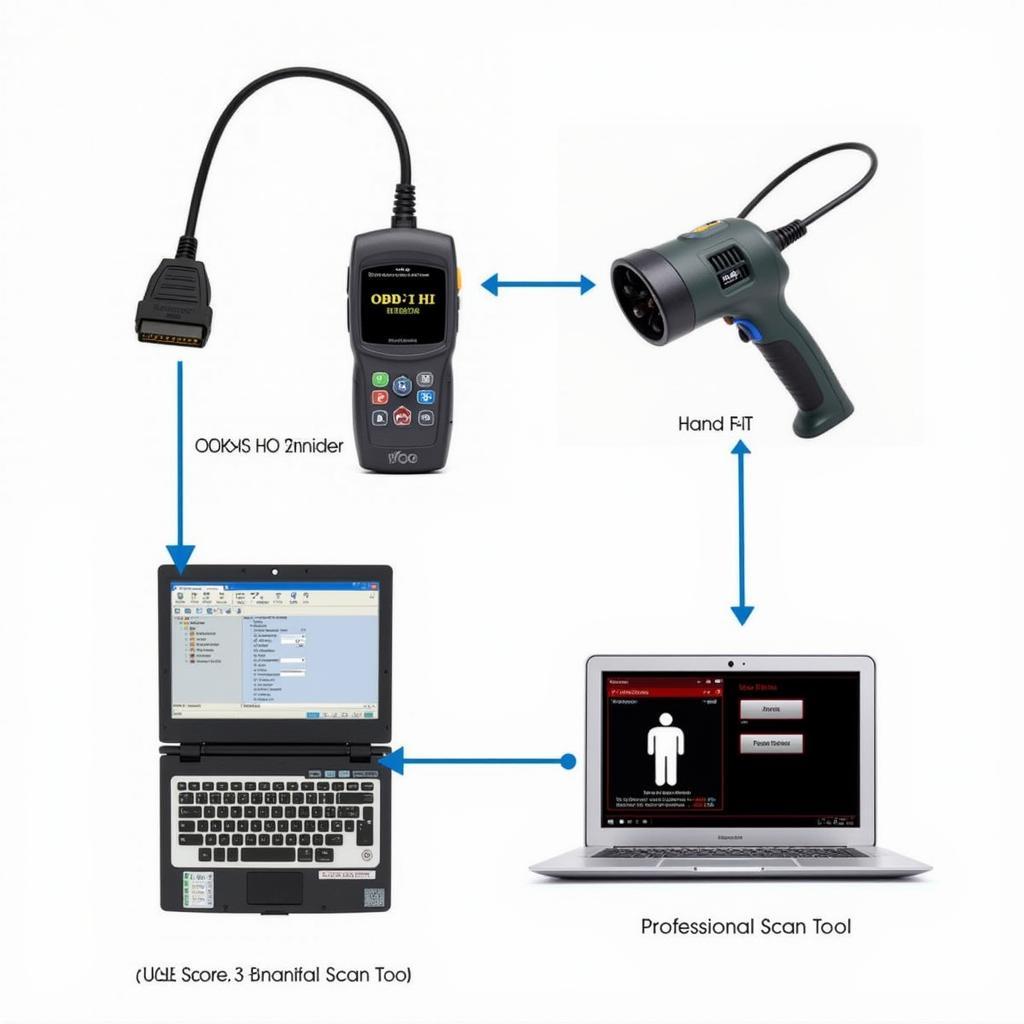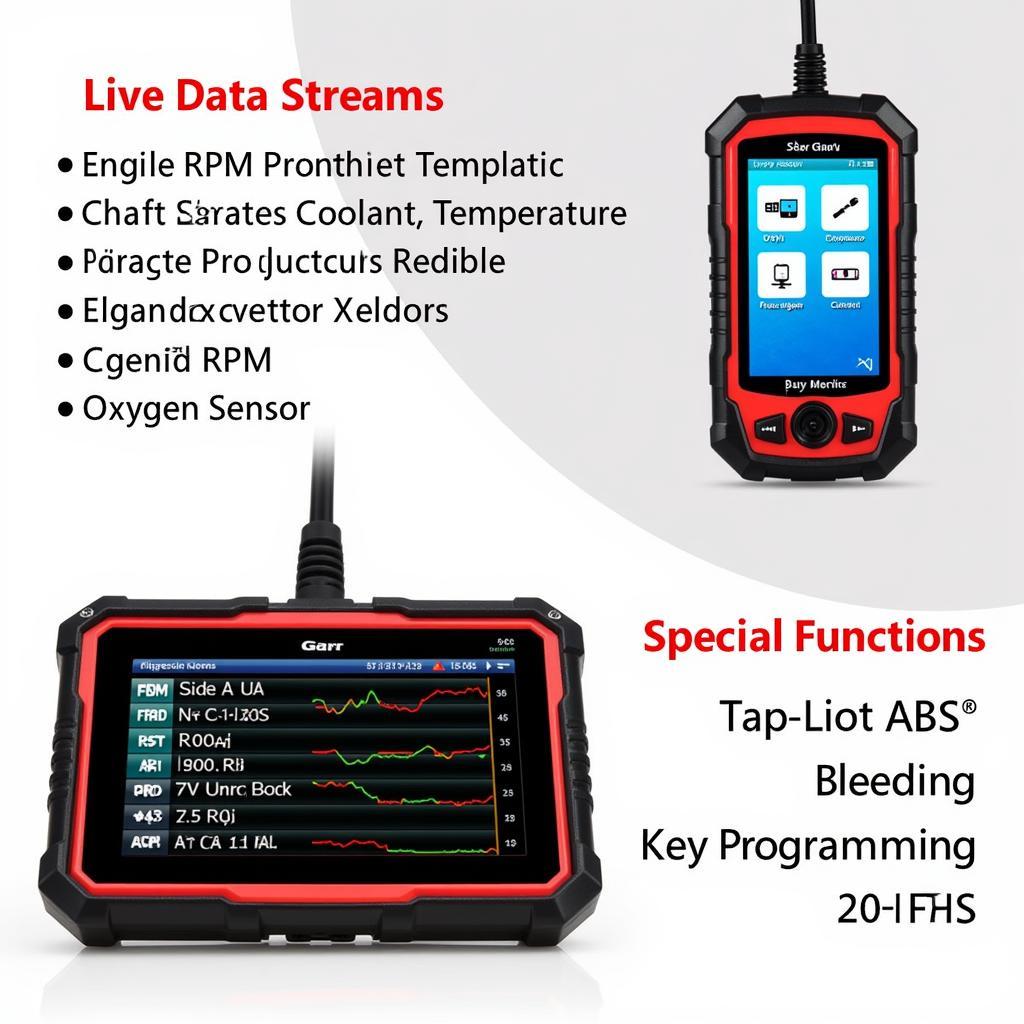A Diagnostics Machine For Cars is an essential tool for any mechanic, professional, or even DIY enthusiast. In today’s increasingly complex vehicles, a reliable diagnostics machine can save you time, money, and frustration by quickly pinpointing issues. This comprehensive guide will explore everything you need to know about diagnostics machines, from their functionality to choosing the right one for your needs.
Understanding the Importance of a Diagnostics Machine for Cars
Modern vehicles are equipped with sophisticated computer systems that control various functions, from engine performance to safety features. When something goes wrong, these systems generate diagnostic trouble codes (DTCs). A diagnostics machine for cars acts as a translator, reading these codes and providing valuable insights into the problem. Without one, diagnosing car problems can be a time-consuming and often inaccurate process.
Having a diagnostics machine allows you to:
- Quickly identify problems: Instead of relying on guesswork, you can get straight to the root cause of the issue.
- Save money on repairs: By accurately diagnosing problems yourself, you can avoid unnecessary repairs and costly labor charges.
- Gain a deeper understanding of your car: You can monitor various parameters and learn how your car operates.
- Enhance your DIY skills: Take control of your car maintenance and repairs.
Types of Diagnostics Machines for Cars
There’s a wide range of diagnostics machines available, each with its own set of features and capabilities. Choosing the right one depends on your specific needs and budget. Here’s a breakdown of the common types:
OBD-II Code Readers
These are basic, entry-level devices that can read and clear basic DTCs. They are affordable and suitable for DIY enthusiasts who want to perform simple diagnostics.
Handheld Scanners
These offer more advanced features than OBD-II code readers, such as live data streaming and the ability to access manufacturer-specific codes. They are a good choice for both DIYers and professionals.
Professional Scan Tools
These are high-end devices used by professional mechanics and technicians. They offer comprehensive diagnostic capabilities, including bi-directional controls, programming, and advanced coding functions.
PC-Based Scan Tools
These connect to a laptop or PC and offer a wide range of functionalities, often at a lower cost than standalone professional scan tools.
 Types of Car Diagnostic Machines
Types of Car Diagnostic Machines
Choosing the Right Diagnostics Machine for Cars
Selecting the appropriate diagnostics machine can feel overwhelming. Here are key factors to consider:
- Vehicle Compatibility: Ensure the machine supports your car’s make, model, and year. Some machines are designed for specific manufacturers.
- Features: Determine the features you need, such as live data streaming, bi-directional controls, and special functions.
- Budget: Prices range from affordable OBD-II code readers to expensive professional scan tools.
- User-Friendliness: Choose a machine with an intuitive interface and easy-to-understand software.
- Updates: Regular software updates are crucial for compatibility with newer vehicles and evolving diagnostic protocols.
What are the benefits of owning a diagnostics machine for cars?
Owning a diagnostics machine empowers car owners to understand and address car issues efficiently. It allows for quick problem identification, potentially saving money on repairs.
How do I choose the right diagnostics machine for my car?
Consider your car’s make and model, desired features, budget, and the user-friendliness of the device. Research different types and read reviews before making a decision.
diagnostics machine for all cars
Key Features to Look For in a Diagnostics Machine
- Live Data Streaming: View real-time sensor data to monitor vehicle performance and identify anomalies.
- Bi-Directional Controls: Test components and systems by activating them directly through the diagnostics machine.
- Special Functions: Access manufacturer-specific functions, such as key programming, DPF regeneration, and ABS bleeding.
- Code Library: A built-in code library provides detailed explanations of DTCs.
- Data Logging: Record data over time to track performance trends and diagnose intermittent problems.
 Key Features of a Car Diagnostic Machine
Key Features of a Car Diagnostic Machine
Future Trends in Car Diagnostics
The automotive industry is constantly evolving, and so are diagnostics machines. Emerging trends include:
- Wireless Connectivity: Connect to your smartphone or tablet for convenient data access and remote diagnostics.
- Cloud-Based Diagnostics: Store and analyze diagnostic data in the cloud for improved data management and collaboration.
- Artificial Intelligence (AI): AI-powered diagnostics can predict potential problems and provide proactive maintenance recommendations.
diagnostics machine for cars fix insignia
“Investing in a quality diagnostics machine for cars is like having a personal mechanic at your fingertips,” says John Smith, a seasoned automotive technician with over 20 years of experience. “It’s a game-changer for anyone who wants to understand and maintain their vehicle effectively.”
Conclusion
A diagnostics machine for cars is no longer a luxury but a necessity for anyone who wants to take control of their vehicle’s maintenance and repair. By understanding the different types of machines available and the key features to look for, you can choose the right one to meet your specific needs and budget. Investing in a reliable diagnostics machine will save you time, money, and frustration in the long run.
FAQ
-
What is a DTC? A DTC is a Diagnostic Trouble Code, a standardized code that identifies a specific problem within a vehicle’s system.
-
Do I need a professional diagnostics machine for DIY repairs? Not necessarily. A basic OBD-II code reader or handheld scanner might suffice for simple DIY tasks.
-
Can a diagnostics machine clear DTCs? Yes, most diagnostics machines can clear DTCs after the underlying issue has been resolved.
-
Are diagnostics machines compatible with all car makes and models? Not all machines are universally compatible. It’s essential to check compatibility before purchasing.
-
How often should I use a diagnostics machine? You can use it anytime you suspect a problem or for preventative maintenance checks.
-
Where can I buy a diagnostics machine for cars? Diagnostics machines can be purchased from automotive parts stores, online retailers, and specialized equipment suppliers.
-
Do diagnostics machines require regular updates? Yes, regular updates are essential to ensure compatibility with newer vehicles and diagnostic protocols.
diagnostics machine for cars 2019
“Regularly using a diagnostics machine allows you to catch potential problems early on, preventing them from becoming major and costly repairs,” adds Maria Garcia, a certified automotive instructor. “It’s about empowering car owners to be proactive in maintaining their vehicles.”
diagnostic machine dpf all cars
Do you have other questions related to car maintenance or specific diagnostic issues? Explore more articles on DiagFixPro to expand your knowledge.
Need assistance choosing the perfect diagnostics machine for your needs? Contact us via WhatsApp: +1(641)206-8880, Email: [email protected]. Our 24/7 customer support team is ready to help.

Leave a Reply